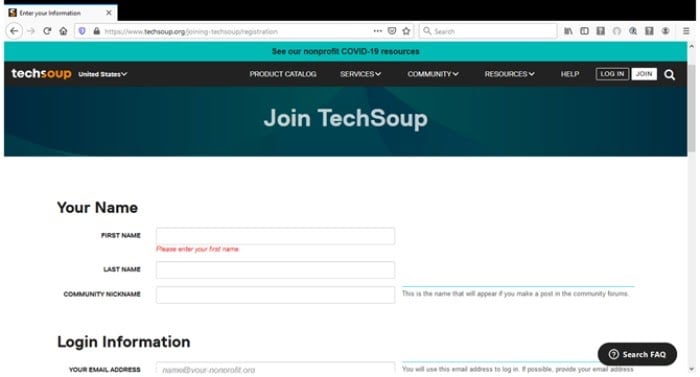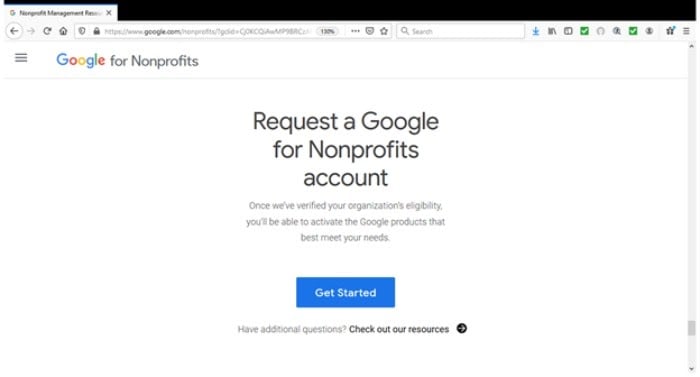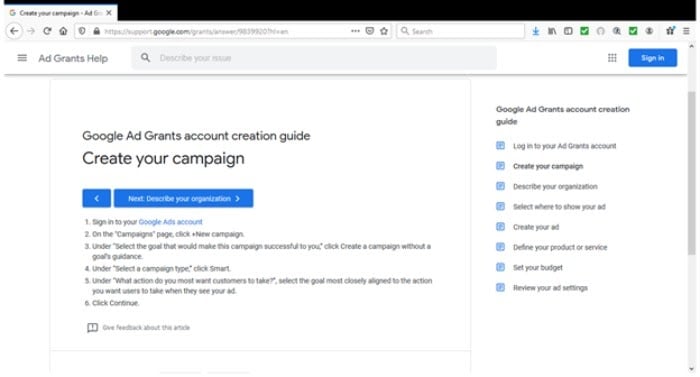Most of us have got a favorite non-profit, and usually with good reason. They might provide vital resources for your community or just be a cause close to your heart. Or they may have played an important role in your own life or that of a family member.
Non-profits need to be visible in today’s digital age — but that takes time, money, and expertise. Which is where Google Ad grants can help.
What Are Google Ad Grants?
If you’re a non-profit, Google Ad grants offer a set amount of funding towards Google advertising every month.
Why did Google launch its Ads grants program, and how do they work?
Google designed the grants program to help nonprofits flourish. The ads work just like regular PPC ads. Nonprofits use them to drive targeted traffic to their sites, just as any marketer or business owner would
And whether you realize it or not, you’ve probably seen some of these ads online; they show up beneath paid-for ads when you do a Google search.
But unlike Google’s PPC ads, there are some limitations. For instance, Google Ad Grant adverts are text only.
Google Ad Grants also have a strict eligibility criterion, and all non-profits must complete an application process. We’ll discuss the details of eligibility below.
Why Should You Apply for Google Ad Grants?
From high-profile nonprofits like Habitat for Humanity and the American Cancer Society to smaller organizations like the Elder Wisdom Circle and Travel to Impact, Google Ads Grants have many success stories.
For example, Habitat for Humanity achieved its marketing goals by combining Ad Grants and Paid Ads. This helped the organization to increase pickups.
The charity then sells the donated items to raise funds for its vital support programs. And to provide low-cost furniture and other goods for the local community.
Using free tools like Google Analytics and Tag Manager allowed Habitat for Humanity to measure its conversion values. As a result, the charity noted a substantial increase over the next six months.
The free ads also helped Habit to Humanity attract more donors and use remarketing campaigns to keep visitors engaged and encourage them to donate again.
But it’s not just the free advertising budget that nonprofits can benefit from. Other advantages of Google Ad Grants include their digital marketing resources.
Your digital marketing strategy is fundamental to success online. The same is also true for nonprofits that want to raise awareness and funds in the digital age.
And if you’re new to digital marketing, Google has you covered. There’s a set of videos to talk you through the various elements of a successful digital campaign, such as:
- Designing your social media strategy
- Starting and building your campaign
- Tracking your conversions
Your nonprofit can also use the ads to:
- Get noticed online and raise awareness of your organization.
- Raise essential funds
- Attract new volunteers
- Achieve the aims of individual campaigns
How Much Money Does Google Ad Grants Offer?
- The Google Ads Grant gives nonprofits $10,000 worth of advertising every year.
- Your monthly budget equals $329 a day, and you can divide this between various campaigns.
If you’re tracking donations, purchases, and fees, then Google suggests using a maximizing conversion bidding strategy. You can read more about this on Google’s support pages.
Your organization can decide how to best spend the money itself. Or you can turn to one of Google’s Ad Grants certified professionals to guide you through the application.
How to Apply for Google Ad Grants
As with any other grant, there’s an application to fill out. But don’t let the process put you off applying. It isn’t nearly as complex as you might think.
In this next section, I’ll break this down into the following steps:
- Check eligibility
- Sign up for a Google nonprofits account
- Activate your Google Grants account
Make Sure You’re Eligible for Google Ad Grants
The Google Ads grants are only open to eligible non-profits. This means your organization must:
- Be in one of the 50 eligible countries. You can find a list of them online.
- Sign up for Google Nonprofits.
- Accept Google’s certifications, which cover non-discrimination and donation receipt/use
- Have an established website that meets Google’s Ad Grants standards, including HTTPS security
- Complete the activation process
Your next step is to establish a Google for Nonprofits account.
Sign Up for a Google for Nonprofits Account
To sign up to Google for Nonprofits:
1. Register with TechSoup. If you’re not familiar with TechSoup, here’s what you need to know:
TechSoup is a nonprofit that offers a variety of tech resources from well-known brands like Microsoft and Intuit QuickBooks. It’s free to join, and all you need to do is complete a short application.

For nonprofits outside of the U.S., you may need to register through one of Google’s other partners. For example, in the UK, you’ll get taken to the charitydigitalexchange.org website.
Note: Verification from TechSoup can take up to 12 days.
2. Request a Google for Nonprofits account by clicking ‘Get Started.’

Then, fill out the requested information, and wait for Google’s verification email.
Activate and Create Your Google Ad Grants Account
To activate your Google Ad Grants account, follow these steps.
- Fill out the eligibility form. You’ll find this when you log into your ‘Google for Nonprofits’ account and look under the ‘Google Ad Grants’ heading.
- Select the ‘Activate’ option.
- You’ll then see an eligibility form. Here, you’ll tell Google more about your organization and confirm your entitlement to a grant.
- Once you’ve completed the form, go back to your Google for Nonprofits account and click ‘activate’ again.
- Then, you should see a checkbox. Confirm you’ve filled the eligibility form out, and click ‘activate.’
That’s it. Activation typically takes up to three business days.
Note: Remember, your Google for Nonprofits/Ad Grants accounts need the same username.
What Can I Do With My Google Ad Grants Account?
Now you’ve established your Google Ads account, your nonprofit can start reaping the benefits, like launching your free ad campaigns.
Setting up your first ads may seem confusing. Let’s walk through it.
Create a Google Ad Campaign

To create your Google Ads Grant marketing, just follow these steps.
- Login into your Google Ads account and go to the ‘campaigns’ page. Now, you’ll want to choose the ‘new campaign’ option.
- You’ll then see an option that says: “Select the goal that would make this campaign successful for you.” You’re looking for the ‘Create a campaign without a goal’s guidance’ option.
- Select your campaign type. Look for the ‘smart’ option.
- Decide what action you want customers to take, then click ‘continue.’
- Describe your business. This is pretty straightforward. Just enter your organization’s details, nonprofit URL, and any other information related to your nonprofit. Then press ‘save.’
- Head to the ‘Where are your customers? page. This allows you to customize your campaign to your local radius or specific areas. Choose the language and select your relevant business category.
- You should see a heading that says ‘what specific products or services do you want to promote in this ad?’. Here, you’ll detail the services your nonprofit offers. Or you can include the auto-suggested keywords. You’ll find these under the ‘suggested for you’ heading.
- Click ‘next’ and choose your budget. Remember to set it at the $329 daily maximum.
- Tap the ‘next’ button, which will take you to the review stage. Here, you can change your ads, before clicking ‘next’ once more.
Your campaign setup is complete!
Google Ad Grant Best Practices
If you’re creating the campaign yourself, the best thing you can do is take your time and consider Google’s best practices. But if you’re not comfortable with this part, remember there are certified professionals who can manage the advertising.
To get you started, here are some tips along with some Google recommendations:
Differentiate Your Organization
What makes your organization different? This is how you stand out from the crowd and encourage engagement and donations. For example, does your organization:
- Donate 100% of its profits?
- Team up with local partners and projects?
- Offer proof and updates on how your non-profit is spending its funds?
- Highlight the good the donations are doing?
If you’re struggling to find your nonprofit’s unique selling point, there’s a useful article on identifying your non-profit’s USP online. And you can also learn more about one non-profit’s marketing approach.
Include a Call to Action
Perhaps the most important part of any online ad is the call to action. What do you want visitors to do next? Think about your goals and what steps you need visitors to take to reach your goals.
Choose Your Keywords Carefully
Begin by thinking of the search terms and keywords you’d use if you were looking for a nonprofit in your niche. Then, use a keyword planner tool like Ubersuggest to perform further keyword research. Use these terms in your ads.
Write Ad Groups and Ensure They Are Relevant
Develop a group of ads for rotation and include your target keywords in each group. You’ll also want to ensure that your ads are relevant to your intended audience.
For example, you may want to target them at attracting:
- Volunteers
- Donations
- Click-throughs
Decide on Your Next Actions
What do your visitors do once they’ve visited your site? Do they donate? Sign up as a volunteer? Ask for information?
Use an analytics tool to determine this, and design future campaigns around relevant keywords.
For further tips for creating successful Google ads, visit their support page.
Track Your Google Ad Success
A recent survey found that 64% of marketing professionals would choose Google Ads over SEO. This is despite SEO’s positive return on investment (ROI) and the organic traffic it delivers.
Why?
Well, according to the survey, Google Ads are better for:
- Conversion
- Measurable data
- Traffic volume
- Effectiveness and scalability.
And there’s another huge plus to Google Ads: they’re easier to implement.
You can see how important these factors are to a marketing professional. But they’re every bit as important to your nonprofit too.
By tracking and analyzing the data of your nonprofit, you can also:
- Optimize conversions to increase your results
- Adjust your ads
- Measure the success of individual campaigns and landing pages
- Gain real-time and audience insights
- See where your donors are located
There may come a time when you want to change your nonprofit ads. Just make sure your nonprofit complies with Google’s policies.
For example, Google doesn’t allow:
- Single keywords, although there are exceptions.
- Keywords with a 1-2 quality score
- Overly generic keywords
Nonprofits must also keep their click-through rates (CTRs) at 5% every month (or risk having their accounts deactivated) and have valid conversion tracking if using smart bidding.
Note: It’s worth mentioning that Google policies are subject to change. Their Ad Grants Compliance Guidelines are available online. Keep up-to-date with these, and if you’re unclear on anything, check.
Conclusion
Google’s Ad Grants program allows qualifying nonprofits to gain visibility, attract more donations, and recruit staff and volunteers. Google Ad Grants is an ideal starting place for nonprofits that don’t have a digital marketing strategy or lack the budget to get started.
Aside from the generous $10,000 limit available to nonprofits, there are many other advantages to signing up with Google Ad Grants, such as access to technology tools, data tracking, and professional services to help grow your nonprofit.
Although it may seem complicated, Ad Grants are free to set up. And if you’re unsure of the correct strategy, consider hiring a PPC consultant to guide you.
Has your nonprofit applied for a Google Ad Grant? Tell us about your experiences or share some tips below.
The post What Are Google Ad Grants? appeared first on Neil Patel.

